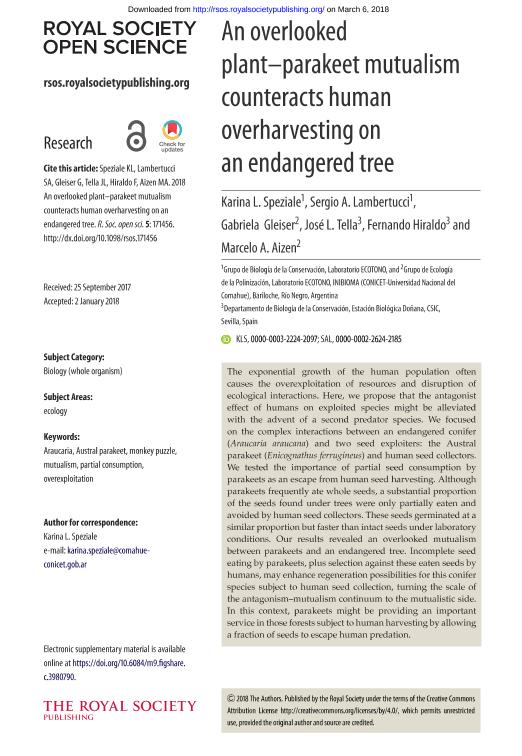Mostrar el registro sencillo del ítem
dc.contributor.author
Speziale, Karina Lilian

dc.contributor.author
Lambertucci, Sergio Agustin

dc.contributor.author
Gleiser, Gabriela Laura

dc.contributor.author
Tella Escobedo, José Luis

dc.contributor.author
Hiraldo, Fernando

dc.contributor.author
Aizen, Marcelo Adrian

dc.date.available
2020-01-14T21:09:36Z
dc.date.issued
2018-01-31
dc.identifier.citation
Speziale, Karina Lilian; Lambertucci, Sergio Agustin; Gleiser, Gabriela Laura; Tella Escobedo, José Luis; Hiraldo, Fernando; et al.; An overlooked plant–parakeet mutualism counteracts human overharvesting on an endangered tree; Royal Society Publishing; Royal Society Open Science; 5; 1; 31-1-2018; 1-10
dc.identifier.issn
2054-5703
dc.identifier.uri
http://hdl.handle.net/11336/94712
dc.description.abstract
The exponential growth of the human population often causes the overexploitation of resources and disruption of ecological interactions. Here, we propose that the antagonist effect of humans on exploited species might be alleviated with the advent of a second predator species. We focused on the complex interactions between an endangered conifer (Araucaria araucana) and two seed exploiters: the Austral parakeet (Enicognathus ferrugineus) and human seed collectors. We tested the importance of partial seed consumption by parakeets as an escape from human seed harvesting. Although parakeets frequently ate whole seeds, a substantial proportion of the seeds found under trees were only partially eaten and avoided by human seed collectors. These seeds germinated at a similar proportion but faster than intact seeds under laboratory conditions. Our results revealed an overlooked mutualism between parakeets and an endangered tree. Incomplete seed eating by parakeets, plus selection against these eaten seeds by humans, may enhance regeneration possibilities for this conifer species subject to human seed collection, turning the scale of the antagonism–mutualism continuum to the mutualistic side. In this context, parakeets might be providing an important service in those forests subject to human harvesting by allowing a fraction of seeds to escape human predation.
dc.format
application/pdf
dc.language.iso
eng
dc.publisher
Royal Society Publishing
dc.rights
info:eu-repo/semantics/openAccess
dc.rights.uri
https://creativecommons.org/licenses/by/2.5/ar/
dc.subject
ARAUCARIA
dc.subject
AUSTRAL PARAKEET
dc.subject
MONKEY PUZZLE
dc.subject
MUTUALISM
dc.subject
OVEREXPLOITATION
dc.subject
PARTIAL CONSUMPTION
dc.subject.classification
Ecología

dc.subject.classification
Ciencias Biológicas

dc.subject.classification
CIENCIAS NATURALES Y EXACTAS

dc.title
An overlooked plant–parakeet mutualism counteracts human overharvesting on an endangered tree
dc.type
info:eu-repo/semantics/article
dc.type
info:ar-repo/semantics/artículo
dc.type
info:eu-repo/semantics/publishedVersion
dc.date.updated
2019-10-10T13:46:56Z
dc.journal.volume
5
dc.journal.number
1
dc.journal.pagination
1-10
dc.journal.pais
Reino Unido

dc.journal.ciudad
Londres
dc.description.fil
Fil: Speziale, Karina Lilian. Consejo Nacional de Investigaciones Científicas y Técnicas. Centro Científico Tecnológico Conicet - Patagonia Norte. Instituto de Investigaciones en Biodiversidad y Medioambiente. Universidad Nacional del Comahue. Centro Regional Universidad Bariloche. Instituto de Investigaciones en Biodiversidad y Medioambiente; Argentina. Universidad Nacional del Comahue. Centro Regional Universitario Bariloche. Laboratorio de Ecotono; Argentina
dc.description.fil
Fil: Lambertucci, Sergio Agustin. Consejo Nacional de Investigaciones Científicas y Técnicas. Centro Científico Tecnológico Conicet - Patagonia Norte. Instituto de Investigaciones en Biodiversidad y Medioambiente. Universidad Nacional del Comahue. Centro Regional Universidad Bariloche. Instituto de Investigaciones en Biodiversidad y Medioambiente; Argentina. Universidad Nacional del Comahue. Centro Regional Universitario Bariloche. Laboratorio de Ecotono; Argentina
dc.description.fil
Fil: Gleiser, Gabriela Laura. Consejo Nacional de Investigaciones Científicas y Técnicas. Centro Científico Tecnológico Conicet - Patagonia Norte. Instituto de Investigaciones en Biodiversidad y Medioambiente. Universidad Nacional del Comahue. Centro Regional Universidad Bariloche. Instituto de Investigaciones en Biodiversidad y Medioambiente; Argentina. Universidad Nacional del Comahue. Centro Regional Universitario Bariloche. Laboratorio de Ecotono; Argentina
dc.description.fil
Fil: Tella Escobedo, José Luis. Consejo Superior de Investigaciones Científicas. Estación Biológica de Doñana; España
dc.description.fil
Fil: Hiraldo, Fernando. Consejo Superior de Investigaciones Científicas. Estación Biológica de Doñana; España
dc.description.fil
Fil: Aizen, Marcelo Adrian. Universidad Nacional del Comahue. Centro Regional Universitario Bariloche. Laboratorio de Ecotono; Argentina. Consejo Nacional de Investigaciones Científicas y Técnicas. Centro Científico Tecnológico Conicet - Patagonia Norte. Instituto de Investigaciones en Biodiversidad y Medioambiente. Universidad Nacional del Comahue. Centro Regional Universidad Bariloche. Instituto de Investigaciones en Biodiversidad y Medioambiente; Argentina
dc.journal.title
Royal Society Open Science
dc.relation.alternativeid
info:eu-repo/semantics/altIdentifier/url/https://royalsocietypublishing.org/doi/10.1098/rsos.171456
dc.relation.alternativeid
info:eu-repo/semantics/altIdentifier/doi/http://dx.doi.org/10.1098/rsos.171456
Archivos asociados
